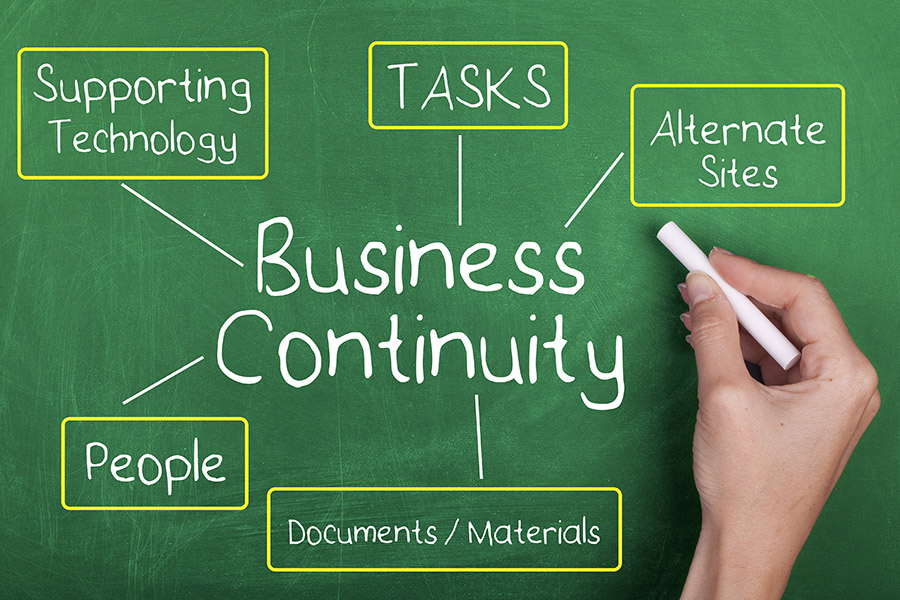
COVID has continuously hit the headlines, our lives, and our workplaces. And you’re probably sick of hearing about it (and about working from home); we know we are. So, we’re not going to talk about it.
Instead, let’s have a look at some of the other reasons why having a business continuity plan is so vital to your business. And why and when you need one.
But first, let’s talk about why your business continuity plan is so important to Australia. Small businesses are the backbone of our economy, and in NSW alone, we contribute over $368 billion of sales and service income to our state’s annual economy. And together, we employ around half the state’s workforce. So, our local economy and people (think workmates, family, neighbours, and friends) are in trouble without us.
However, when that tornado tears up the town, huge hailstones hit, floods force evacuation, and spiders swarm our homes and offices, we’re not always as prepared as we should be. (Yes, Australia is an ‘exciting’ place to live.)
But for some, a natural disaster may well be the tipping point if their business viability is already on a knife’s edge. And that’s without internet and power outages, disruption to essential services, data breaches or cash flow shortages (or COVID).
So, what does ‘prepared’ look like?

Make like a boy scout
The ‘be prepared list’ is short:
- 1. Build a plan.
- 2. Share your plan.
- 3. Have a backup plan for alternative premises
But in saying that, we also acknowledge that it’s easier said than done. And like most things, the longer you put it off, the greater the chance that you’ll need it.
1. Build that plan
That said, how do you build a business continuity plan? The NSW Government Small Business Commissioner has already prepared this great guide called ‘Prepare for the unexpected’ with templates and disaster specific checklists.
You can probably complete most of it for yourself, but it’s not until you get to the ‘Back up data to the Cloud’ section that you may need some external, expert help. If you are Business Owner Brad from Wattle, with his piles of paperwork and reluctance to invest in new technology, then you most certainly do!
We can make sure you’ve ticked all the cloud storage and application boxes. The ones that ensure your client records, schedules, invoices, blueprints and maps and other critical business documents are digitalised and uploaded to a cloud for safekeeping. So even if your physical office is closed for business, you can keep on working.
We can replace on-premises software solutions (you know, the ones on the server under the desk) with cloud applications to handle your business processes and emails. We can make sure that just because your phone system is down, you can still communicate with customers and suppliers through cloud-based video or voice calls. So, it won’t matter if you are in your spare room or have decided to take a break from it all on the Gold Coast, you can still work.
And because a cyber attack is also a strong possibility for most businesses these days, we can provide up-to-date cybersecurity solutions, and make sure your applications (and all the data in them) are backed up and patched on the go – not once every two years.
Tip: A data backup plan is non-negotiable for many reasons, from disaster recovery to hardware failure, loss, or theft. To give some context, even back in 2010, almost 6,500 laptops were reported as stolen from NSW homes!
2. Share that plan
A business continuity plan is next to useless if no one knows about it. It’s like a hotel with no exit signs. When the water sprinklers go off, the guests have no idea which way to head for dry land.
You need to share your plan with your team, not have one person hold it under lock and key (not pointing fingers here at Office Manager Maggie). Then, if you do need to use it, there are no surprises. It’s also important to remember that a business continuity plan is an active document that needs to be reviewed and updated regularly to remain current and relevant.
When a plan is shared, everyone understands what needs to be done today, what happens tomorrow, and the day after. So, you’re back to business-as-usual, as fast as possible.
3. Have a workspace backup
If you need to evacuate your work premises or can’t enter them, you need a plan B for a temporary workspace. Alternatives could include a spare room, a garage or a shed, or another business’s spare offices. Or perhaps a communal office space or hub? Wherever it is, just make sure it has internet access!
But if you can’t find enough space for everyone, or it’s simply not practical for the team to commute to a new location, then not to worry. You’ve already put in place those cloud applications, which means you can all work and collaborate from home.
Disasters, man-made and natural, are a reminder that your website needs to be as prepped and ready as your employees. Online shopping in Australia has grown by 35.3% in 2021 already, so if your products or services aren’t accessible or able to be purchased through your website – you’re not embracing the future. (Another disaster in the offing.)
Why you need to be ready
As said at the beginning of this blog, your business is important to your people, community, and state. And hey, it’s important to you too.
You’ve invested your heart, soul, and money in building up a customer base, employing the right people (even if it’s just you!), and forging solid relationships with suppliers and other businesses, and carving out a living in a competitive world.

So, we’re with you. And we’re ready to help you tick all the technology boxes on your business continuity plan. Call us.

